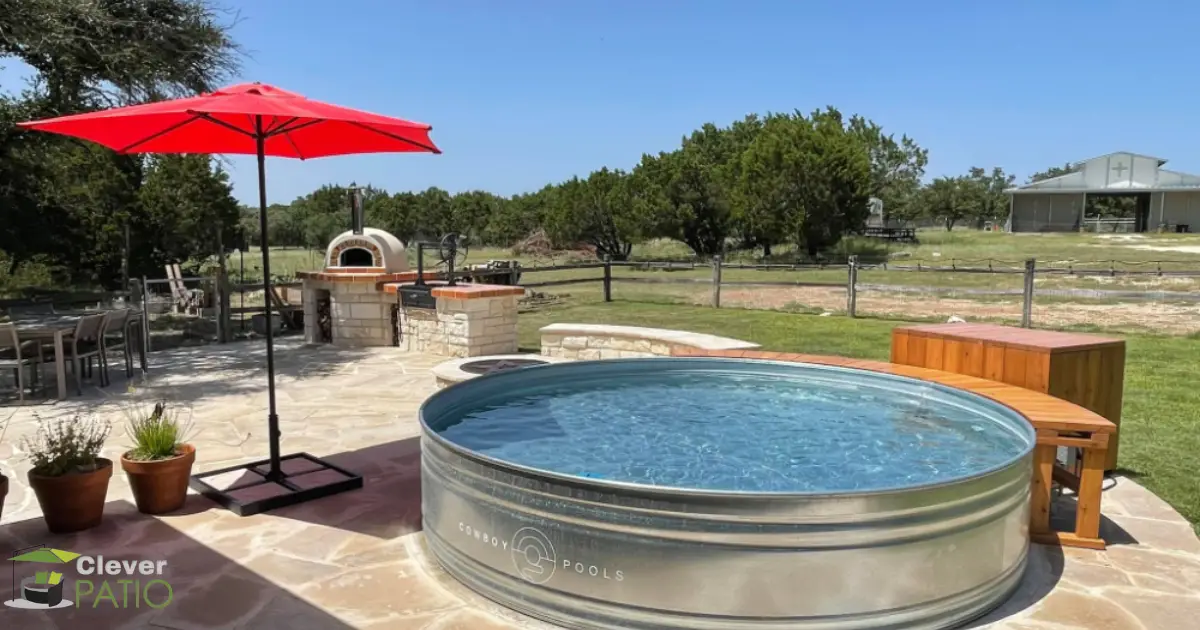
Building a patio is an excellent way to add some extra living space and increase your property’s value. If you live in Alaska, there are certain things that you need to know about building a patio before starting construction on the project.
This blog post will provide information about what permits are required for patios in Alaska, as well as how much it costs and where they can be obtained.
Do You Need A Permit To Build A Patio In Alaska?
A one-story detached building with a roof area of less than 120 square feet does not need a building permit. However, to install an attached patio cover, a building permit is required.
In Alaska, a building permit is necessary to construct or alter any permanent structure, including a patio cover.
A “permanent” structure includes those that will remain attached to the ground after construction, as well as those supported by piers and posts.
Read More: Cost To Build A Pool And Lanai In Florida [Calculator]
In other words, you cannot simply place a structure on the ground and declare it impermanent – regardless of how temporary it may feel – or else you will be required to obtain a building permit for your project.
If you are unsure whether your proposed patio cover would need a building permit, contact your local building department.
For additional information about this topic, please refer to Title 16 of the Alaska Code of Regulations (CCR), Article 2 entitled “Administration.” To find out which agency in your area enforces these regulations, please refer to the state map on page 18 of CCR, Article 2.
Do You Need A Permit To Build A Patio Cover In Alaska?
Many building projects in Alaska, including new construction and some remodeling jobs, need permits. Permits are required for many types of building projects, including new construction and certain renovation works. If the work will be done in an unincorporated region of Alabama, permits are granted by the county instead of the city.
In general, a patio cover would come under the category of a deck or porch so you will need to obtain a permit from your building department.
That being said, there are many different types of patio covers and it’s important to know what category yours falls under.
Depending on how much work your project entails, you may need other approvals as well.
Do You Need A Permit To Pour Concrete In Your Backyard In Alaska?
Under Alaska’s Building Code of 2002, Section 106.3(15) stipulates that a building permit is not necessary for pouring concrete, platforms walks and driveways less than 30 inches (762mm) above grade and not extending over any basement or story below, therefore the driveway construction is not regulated by the building code.
However, new driveway construction required permits if plans show proposed changes in elevation greater than five (5) feet between adjacent grades; also new walkways over any basement or story below require permits if they are more than 30″ high.
If you need to pour concrete with an extension outside of the property line onto city property you will probably need to get a permit for this.
You should contact your local public works department or city hall to find out whether you will need to get a permit before digging the hole and pouring the concrete, just in case it is not covered by these exceptions.
If you are making any other size of pour that doesn’t fall into either of the categories mentioned above then you will definitely need to get a building permit approved by your local building department.

Do I Need A Permit To Enclose My Patio In Alaska?
Yes, if you want to enclose a patio in Alaska, you will need a permit if the addition exceeds 120 sq ft. Building permits are required for building or making changes to an existing structure.
This includes decks, patios, and other covered porches that require a permit in the state of Alaska.
Most home improvement projects that require permits fall under the residential permits category. These projects include:
- Building a new structure on your property, such as a garage, storage building, guest house, etc.
- Setting up a pre-made structure, like a shed.
- Building an addition onto an existing structure. This includes: building an attached garage, building a sunroom, adding additional rooms to the house, and extending the area of an existing room.
- Making structural changes to an existing building. This includes: removing walls, building new walls, enlarging a window or door opening, enclosing a garage or carport, and installing a fireplace and/or chimney.
- Building a deck, patio, patio covering, porch or porch covering.
- Installing RV covers, boat covers, carports, and screened porches or sunrooms.
- Installing a pool or spa greater than 24 inches deep, either in ground or above ground.
- Constructing a fence over 6 feet high or a retaining wall over 4 feet high.
- Constructing anything adjacent to a floodzone.
- Building piers, boathouses, or bulkheads.
- Repairs to roofing and siding.
- Any work that requires rewiring or installing new wiring.
Do I Need A Permit To Build A Pergola In Alaska?
No. Pergolas do not need permits to construct, as long as they are not connected to the home and have a surface area of less than 10 square meters (107 square feet).
However, if the pergola is larger than 10 square meters (107 square feet) and it will be attached to your home, you will need a building permit.
If it is attached to another structure on the property such as a fence, you will need both a building permit and a separate encroachment permit from the city or county.
What Can I Build Without A Permit In Alaska?
No building or structure may be constructed, erected, enlarged, improved, altered, repaired, relocated, converted, or demolished unless a separate permit has first been granted by the building official in Alaska.
There are some exceptions to this general rule.
No Permit Necessary
There are plenty of home improvement projects that require permits, but there are also plenty that doesn’t. You’re busy enough planning your project without adding unnecessary steps to the mix. So, before you get in too deep, here are the projects you might be about to tackle that DO NOT require a permit.
- Painting inside or outside
- Installing new countertops
- Installing new cabinetry
- Replacing light fixtures and/or ceiling fans
- Replacing any fixture or equipment that does not require rewiring
- Building a fence less than 6 feet high
The first exception is that permits are not generally required for building or structure work exempt from permit requirements under the Alaska Building Code (CBC).
These types of construction projects include decks less than 30″ above grade and fences less than 6 feet in height.
Permits may still be needed for other reasons if the project involves hazardous materials or use certain special design features.
All states have exemptions to their code, so it’s always best to check with your local jurisdiction before starting any work on a deck or fence.
Secondly, building permits aren’t typically required for structures (and associated equipment) used exclusively for agricultural purposes; however, these structures must meet certain criteria as defined by Isla v. Central Contra Costa Sanitary District.
Thirdly, building permits are not required for certain accessory structures used for storage or function space when the floor space being used does not exceed 120 square feet.
If you want to know more about specific requirements related to this exemption, please see Alaska Building Code Section 102.2(a) and our article, “What Can I Build Without A Permit In Alaska? (Part 2).”
The fourth exception is that a permit may be obtained as a result of an appeal as specified by the Alaska Code of Regulations Title 24 §26094(c).
It should also be noted that any work performed under the authority of a building permit issued under this section shall be subject to subsequent inspection and approval and is therefore not exempt from any permit requirement.
What Happens If You Build Without A Permit In Alaska?
Contractors who break the law may face CSLB penalties, including civil penalty assessments of up to $5,000 per violation, an order of correction requiring payment of permit fees, and any assessed fines levied by the local building department, and license suspension or revocation.
How Much Does A Building Permit Cost In Alaska?
The typical cost of a building permit in Alaska is $1,200, which was determined by national standards.
The typical cost of a building permit for an average-size home is $1,200, though it can go up or down depending on the location and type of construction.
At this point, you should check with your local building authority to determine what kind of work falls under the umbrella of “construction.”
For instance, if you plan to build an addition onto your existing residence for extra storage space, then that would be considered “alteration.”
On the other hand, if you want to convert your basement into an apartment where someone could live full-time or part-time…you’d need a “building permit” for that.
When you are approved for your building permit, your local government will order an inspection of the work being done on your house or property. This will happen during various stages of the project.
A small fee is charged for this check-up process, but it’s well worth it because it ensures that all codes are being followed and the quality of the work is up to par.
For example, if you had hired a carpenter to build an addition onto your home but he cut corners…the inspector would notice things like electrical work that didn’t meet code requirements or drywall screws not being countersunk so they wouldn’t stick out on the surface of the wallboard surfaces!
If you have permits pulled before they are due to expire, you will be charged a “re-inspection” fee.
Do You Need A Permit For A Gazebo In Alaska?
Do I need a permit? Non-habitable storage sheds, workshops, gazebos, cabanas, and similar non-habitable structures with a size of more than 120 square feet must be submitted for a permit.
Resources: Alaska Code of Regulations




Leave a Reply